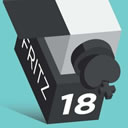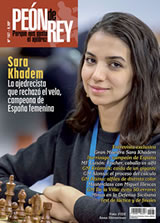The first volume
"This is probably the most delightful chess book I have ever read", wrote the Briton Nigel Short, defeated by Gary Kasparov in the 1993 World Championship final, in his review for the Sunday Telegraph. In this Spanish edition, which corrects the errors of previous Russian and English publications, the reader will be impressed by Kasparov's wise blend of his undisputed number one status since 1985 and his passion for history. In his in-depth analysis of the world champions - and of the players who left a deep imprint without achieving the throne - the author places each one in their time and dissects the psychological traits that influenced their games. And in glossing these, Kasparov merges all the analyses that the amateur can wish for, those carried out in his day by the protagonists and their contemporaries, those of the later Grand Masters, those of the most powerful computers of our day, and those of Kasparov himself, who takes special care in distinguishing the sources for greater enjoyment of the reader. The past, the present and the foreseeable future are merged in this first volume of this great work which will consist of five volumes. Given that the quality of the games grows as they approach our days - all champions learned from their predecessors - it is worth asking: what will Short say when he reads the following deliveries?
The second volume
Gary Kasparov was still a child when Mikhail Botvinnik (1911-1995), the patriarch of Soviet chess, saw in him a future champion and revolutionary, and welcomed him as his favorite pupil in his special school for great talents. As clairvoyant as Botvinnik was, he could not imagine that this restless young Azerbaijani would 30 years later dissect the games of all world champions with exemplary depth. In this second volume, Kasparov analyzes the scientific style that defined his beloved teacher, the almost poetic harmony of Vasili Smyslov, the permanently erupting volcanic mind of Mikhail Tal and the consistency and mental discipline of the only non-USSR (or Russian) born champion of those who reigned between 1927 and 1972, the Dutchman Max Euwe. The work is completed with a tribute to justice: Paul Keres, David Bronstein and Efim Geller were crownless champions, they did not reach the throne by bad luck or by being born a few years earlier or later, and it is only fair that they appear in this gallery of dissected kings, whose faces can be seen in 64 pages (one for each box on the board!) dedicated to photos.
The third volume
It was the roaring sixties when a deaf genius, like Beethoven, reminded us that the beauty of chess lies not only in romantic sacrifices. Many of Tigran Petrosian's movements are impressive because a melodic thread links the movements to the end, almost always elegant. Although the Armenian used to listen to Tchaikovsky before his duels, another world champion, Mikhail Tal, compared his art to that of Liszt, perhaps because of the great complexity that unites them: the Hungarian's piano sonatas are as difficult to interpret as Petrosian's subtle maneuvers. Hiding from the left to throw from the right, long-term material deliveries and pre-thought prophylaxis even to the opponent define a genius, unfairly labeled for his unfighting draws. Something similar happens with his successor, Boris Spassky, whom we can compare with Mozart for the immense talent of both, although the Austrian was hyperactive and the former Soviet, now French, an ace of idleness. However, and even though we almost always talk about him as a supporting actor in the great Bobby Fischer movie, Spasski is one of the greats in history, the tenth world champion, with all the credit. His work and that of Petrosian can be heard in this book under the wonderful baton of Gary Kasparov, who also does justice to four who were not champions but virtuosos: Gligoric, Polugaievski, Portisch and Stein, the luxurious opening acts of a masterful concert.
The fourth volume
One genius, Gary Kasparov, takes a close look at another genius, Bobby Fischer, in one of the most interesting books ever written about chess. They are two of the most charismatic and revolutionary players in over fifteen centuries of documented history, but very different from each other. Fischer had a very rough childhood in a country, the United States, where chess is taken very seriously in schools but is not popular as a profession. However, his overwhelming victories against Soviet stars came in the middle of the Cold War, and that made him a national hero, which also shocked the mental sport: millions of people were introduced to the game of kings thanks to him. When Fischer was proclaimed world champion, in 1972, Kasparov was a nine-year-old boy, destined by his mother to be world chess champion, and educated especially for that purpose with a very favorable environment in a country where being a chess player was a very honorable profession. It's almost impossible for a player, whatever his level, not to enjoy Fischer's games. Hence, it is only logical that the author of this book should endeavor to gloss the work of the great champion in volume 4 of My Genius Predecessors. An essential book that also includes 64 pages of photographs.
This is Volume 5
Three fascinating characters, far beyond their status as chess players, were the great stars of mental sports between 1975 and 2005. The youngest, Gary Kasparov, radiographed in this book with his usual precision and brilliance the work of the other two, Viktor Korchnoi and Anatoli Karpov, who taught him so much. These three K's have a novel life in common, and also represent three ways of understanding life in the extinct USSR: Korchnoi and the dissidents; Karpov and the old Kremlin guard; Kasparov and perestroika. But if we only talk about chess, all three are myths. No one disputes that Karpov and Kasparov are among the top five of all time. Korchnoi wasn't world champion because his best years coincided with those of Bobby Fischer and Karpov, but even today, he fights with the elite in a sporting longevity feat. The reader will enjoy in these pages many of the most memorable battles held on the board during the last quarter of the 20th century, as well as valuable contributions and interpretations by Kasparov. And, when you get to the last page, you'll probably find it unfair that chess isn't spelled with K.




















































